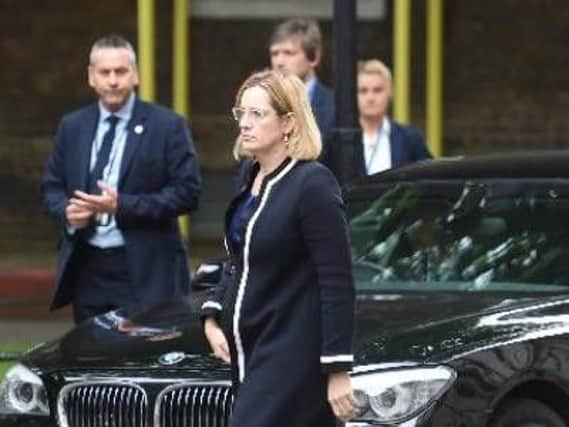Government to boost funding for Prevent de-radicalisation programme following Manchester attack


Speaking this morning, Home Secretary Amber Rudd said there would be an "uplift" in the strategy to improve its effectiveness, and this would include an increase in funding.
The comments follow Monday night's terrorist attack on an arena in Manchester, which has left 22 dead and dozens more injured.
Advertisement
Hide AdAdvertisement
Hide AdThe identity of the attacker has now been confirmed as British-born Salman Abedi, who is understood to have recently returned from Libya and was reportedly known to intelligence services.
The Government's Prevent strategy was set up to safeguard vulnerable individuals who are believed to be at risk of radicalisation.
It has been subject to fierce criticism in recent years due to accusations that it lacks transparency and has created a “them and us” situation between the Government and Muslims.
A number of organisations and MPs - including Bradford West's Naz Shah - have called for an independent inquiry into its effectiveness.
Advertisement
Hide AdAdvertisement
Hide AdSpeaking in Parliament earlier this year, Ms Shah stated that while it was "clear... that we need a prevention strategy", the current approach has left people feeling "stigmatised" and suspicious.
However, in an interview with the BBC today, the former independent reviewer of terrorism legislation, David Anderson QC, said that while Prevent has been a controversial strategy, the Manchester attack "might focus some minds".
Despite his previous criticism of the programme, he went on to suggest it needed to be "strengthened" and would benefit from increased funding.
"The important thing to recognise is that of course we need a policy to prevent our young people from strapping on suicide belts and being drawn into terrorism," he told the BBC.
Advertisement
Hide AdAdvertisement
Hide Ad"It's just that if the policy is to be as effective as it possibly can be it needs to be not only strengthened, which I think is what certainly the last government had in mind, but also palatable to all the communities that it affects.
"We have a counter-terrorism budget of something like £3 billion a year.
"Prevent in some ways is the most important part of that because it holds the long term solution to these terrible problems, but it's only 1% of the amount of money that we spend and it's very important I think that we spend it as effectively as we possibly can."
Responding to Mr Anderson's comments, Ms Rudd indicated that the Government would be undertaking a review of the programme after the election.
Advertisement
Hide AdAdvertisement
Hide AdHowever, she dismissed suggestions that the programme has created mistrust among Muslim communities, as she praised the programme's "good work".
"There is an industry out there that doesn't like Prevent, but I can tell you that 150 people for instance were stopped, because of Prevent activity, from travelling to Syria last year, 50 of whom were children," she said.
"There were 142 community organisations working in communities. I've been to visit some of them to stop young people becoming radicalised. They do good work.
"We can always learn more, we can always improve and as the threat against us changes, we need to make sure that our defences change.
Advertisement
Hide AdAdvertisement
Hide Ad"I have been proposing and we will be going ahead with an uplift in Prevent and when we do that we will also be making sure that it has (an) even more effective outcomes in communities to protect us, to keep us safe."
Asked if this meant more money, she said: "Absolutely, I already proposed that a number of months ago and we will be going ahead with that I hope after June."
In the same interview, she also denied suggestions that the decision to deploy soldiers to bolster security in UK cities was a result of a shortage of armed police officers in forces outside London.